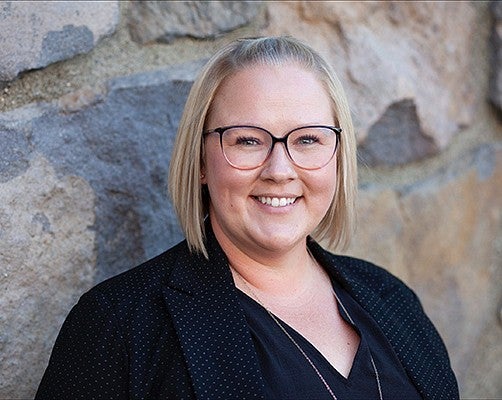
Leadership Rooted in Belonging: Stacy Bonner’s Journey from UO to District Director
“Inclusion isn't just a placement; it’s a mindset and a commitment to equity.” – Dr. Stacy Bonner
Stacy Bonner (Arbuckle), PhD, a 2022 graduate of the University of Oregon’s College of Education, has built a career defined by empathy, inclusion, and systemic transformation. As a Director of Special Services for the Pasco School District in Washington, Dr. Bonner leads with a vision that centers belonging; not just for students with disabilities, but for every child navigating the complexities of public education.
Dr. Bonner earned her doctoral degree in Special Education, a program she credits with shaping both her professional trajectory and personal philosophy. “One way my UO experience prepared me for my chosen career path was through the support of faculty who encouraged me to dive deeply into my specialty area while also exploring opportunities in related specialties,” she said. “Their guidance not only helped me develop a strong foundation in my focus area, but also gain a broader perspective and skill set that has been invaluable in navigating a dynamic and interdisciplinary field.”
Her leadership is grounded in a belief that inclusion is not merely a placement decision, it’s a mindset. “I hope to make a difference in my field by creating inclusive and belonging-centered experiences for all children in schools,” Dr. Bonner explained. “I’m deeply passionate about working alongside educators to build supportive, collaborative relationships that foster welcoming, safe, and meaningful environments, especially for students with disabilities.”
Dr. Bonner’s advocacy is backed by data and driven by compassion. She cites statistics from the National Center for Education Statistics, noting that students with disabilities are nearly 2.5 times more likely to drop out than their peers. “Children are telling us, through behaviors, disengagement, and absences, that they don’t feel like they belong at school,” she said. “I want to be part of the movement that listens. It’s time to fix systems, not kids, because kids aren’t broken.” Her leadership style reflects this philosophy. She finds affirmation in moments when staff or families feel seen and heard. “Anytime a district staff member, whether it’s a principal, teacher, instructional assistant, or parent, shares that they feel like they are being heard, seen, and supported by my leadership approach, I know I am in the right place and doing the right work.”
Dr. Bonner’s journey was shaped by key mentors and transformative experiences at the College of Education. One pivotal moment came during a conversation with her advisor, Dr. Steph Shire, after receiving a disappointing grade. “Instead of asking me what I could do differently, she celebrated me for taking a course outside my comfort zone,” she recalled. “That interaction forever changed how I view my perceived ‘failures’ not only in my career, but in life in general.” Another influential figure was Dr. Spirit Brooks, a visiting professor who taught qualitative research. Their shared connection to Oregon’s Outdoor School program led to a collaboration that eventually became her dissertation. “Long story short, this led to additional opportunities which then became my dissertation,” she said, highlighting the power of authentic relationships and shared values."
Dr. Bonner’s career path evolved during her time as a student. Initially planning to pursue academia, she discovered a deeper passion for K–12 public education through her internship with Springfield Public Schools. “After my second year, I decided to pursue my administrator license through UO,” she said. “It was during my internship that I realized this was the path I wanted to take.” Her goal is to bridge the gap between research and practice. “I am committed to continue to apply the tools and knowledge I gained through my educational experience to help bridge the research-to-practice gap in meaningful ways,” she said. “As I move forward in my career, I am eager to continue developing leadership practices that honor both the science and the human side of education.”
Support systems at the College of Education played a crucial role in her educational success. The PhD cohort and peers in special education provided both academic and emotional support. “We built friendships that extended beyond the classroom. I am still in touch with many of them today,” she said. She also found practical resources at the COE invaluable, especially the HEDCO Learning Commons and Education Station Café, where both spaces offered support and a sense of community.
Dr. Bonner’s advice to current students is rooted in her leadership philosophy: “If you don’t know what to do, then listen. If you think you know what to do, listen first. Ninety-five percent of conflicts I see and experience as a district leader are because someone just wants to be heard and listened to.” To her younger self, she would offer a message of affirmation: “You are not an imposter. You belong here. Nobody expects you to have all the answers. Embrace failure and celebrate yourself when you do hard things, even if they don’t turn out how you had planned. This is how learning and growth happen.”
Looking ahead, Dr. Bonner is focused on strengthening ties between schools and community organizations. She recently joined the board of directors for her local Boys and Girls Club, aiming to build bridges that support students beyond the classroom. “These programs directly support our students, staff, and families,” she said. “I see this partnership as an important way to strengthen the bridge between schools and community resources.”
Dr. Stacy Bonner’s journey from doctoral student to district leader is a testament to the power of inclusive leadership, the importance of listening, and the transformative potential of education. Her work continues to shape systems that honor every learner, proving that when leaders lead with heart, schools become places where everyone (staff, students, and families) belongs.
